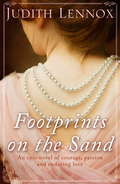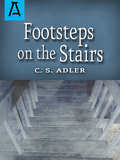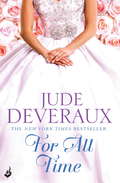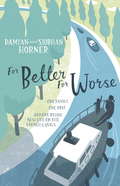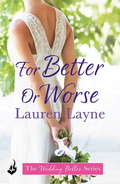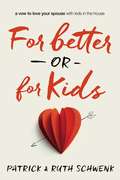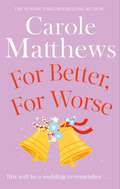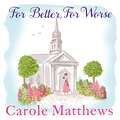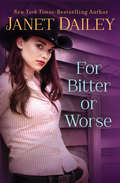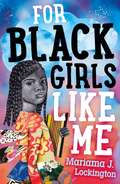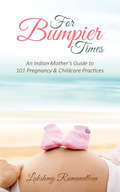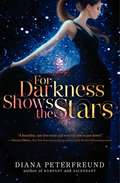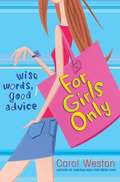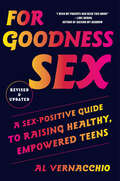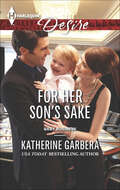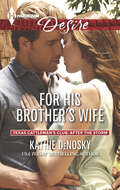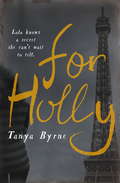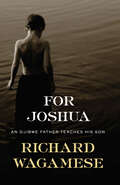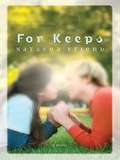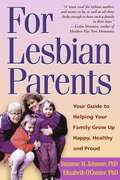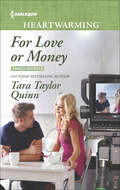- Table View
- List View
Footprints on the Sand: An epic novel of courage, passion and enduring love
by Judith Lennox'I have fallen completely in love with Judith Lennox's writing - she's a fantastic storyteller!' Jill Mansell With the onset of war, everything changes... Judith Lennox writes an unforgettable novel of enduring love and the tides of fortune in the compelling novel Footprints on the Sand. Perfect for fans of Dinah Jefferies and Lucinda Riley.The Mulgraves are a rootless, bohemian family who travel the continent, staying in crumbling Italian palazzos, Spanish villas, French vineyards - belonging nowhere, picking up friends and hangers-on as they go, and moving on when Ralph Mulgrave's latest enthusiasm dwindles. Faith, the eldest child of the family, longs for a proper home. But in 1940, Germany invades France and the Mulgraves are forced to flee to England. Faith and her brother Jake go to London, while Ralph reluctantly settles in a Norfolk cottage with the remnants of his family.In the intense and dangerous landscape of wartime London Faith finds work as an ambulance driver, and meets once again one of Ralph's retinue from those distant and, in retrospect, golden days of childhood. Through war and its aftermath, it is Faith on whom the family relies, Faith who offers support and succour, and Faith who is constant and true in her love. What readers are saying about Footprints on the Sand: 'Curl up and get lost in this wonderfully written book that takes you from early 1900 through to the 1960s''[Judith Lennox] can paint a picture so vividly in your mind, make you care about her characters, make you feel the anguish, the partings, the love that is taken away and then given back. A wonderful read''Such wonderful escapism - well written and compelling!'
Footprints on the Sand: An epic novel of courage, passion and enduring love
by Judith LennoxThe Mulgraves are a rootless, bohemian family who travel the continent, staying in crumbling Italian palazzos, Spanish villas, French vineyards - belonging nowhere, picking up friends and hangers-on as they go, and moving on when Ralph Mulgrave's latest enthusiasm dwindles. Faith, the eldest child of the family, longs for a proper home. But in 1940 Germany invades France and the Mulgraves are forced to flee to England. Faith and her brother Jake go to London while Ralph reluctantly settles in a Norfolk cottage with the remnants of his family. In the intense and dangerous landscape of wartime London Faith finds work as an ambulance driver, and meets once again one of Ralph's retinue from those distant and, in retrospect, golden days of childhood. Through war and its aftermath, it is Faith on whom the family relies, Faith who offers support and succour, and Faith who is constant and true in her love.
Footsteps on the Stairs
by C. S. AdlerFun loving Dodie is at a creepy beach house to get to know her neat little stepbrother and her cool, perfect stepsister, Anne. Anne is thirteen, like Dodie, but they couldn't be more different. When both girls hear footsteps on the stairs at night, they are thrown together to solve the mystery. Their investigation lands them in the middle of a jealous quarrel between two long dead sisters. How can Dodie and Anne pacify the ghosts?
For All Time: Nantucket Brides Book 2 (Nantucket Brides)
by Jude DeverauxFor All Time continues New York Times bestselling author Jude Deveraux's breathtaking Nantucket Brides trilogy, introducing characters from a new generation of Montgomery-Taggerts, the beloved family from her classic novels.At the wedding of Alix Madsen and Jared Montgomery, Jared's cousin Graydon can't look away from bridesmaid, Toby Wyndam. It's not just her quiet beauty or humour - Toby possesses the truly remarkable ability of being able to distinguish Graydon from his identical twin brother, Rory. According to family legend, such a gift marks her as Graydon's True Love.Graydon is heir to the Lanconian throne and must to marry a noble woman who has been chosen for him. Yet, intrigued by Toby, he asks her to help him hide on Nantucket for a week away from regal responsibilities. Knowing their union to be impossible, they promise to simply be friends.But there are forces at work beyond their control, which are ruled by time itself and a seductive spell is cast over Graydon and Toby. If they are to be together, they must change what once was, as well as what will be.Jude Deveraux. Love stories to enchant you.Read Alix and Jared's unforgettable love story in True Love, the first in the Nantucket Brides trilogy and look for the third gorgeous romance in Ever After.
For Better For Worse, For Richer For Poorer
by Damian Horner Siobhan HornerA hilarious, true story of life-change, no going back, 40th birthdays and mid-life crisis. Follow the adventures of a husband and wife (plus two small children) as they take a barge through the French canals towards the Bourgogne and Canal du Midi - with The Mediterranean and Spain beckoning.Damian Horner is scared that fifteen years in advertising have turned him into a bastard. As he approaches his fortieth birthday, he wants to see if he can be a good husband and a good father before it's too late. Siobhan, his wife, would like to find out too but has other worries. Do marriage and kids mean she's now trapped in a world of suburban domesticity?It takes a miserable day and a bottle of wine to change everything. Suddenly Damian and Siobhan decide to throw their lives in the air and escape to the French canals, taking with them their son Noah who is two years old and can barely talk, and their daughter India who is one and cannot walk.Told in two voices, we hear both sides of their story and get the whole truth as Damian and Siobhan describe coming to terms with themselves and their life on board an old fishing boat in France with no space, no fridge, no charts, no deadlines and no flushing toilet.
For Better For Worse, For Richer For Poorer
by Damian Horner Siobhan HornerA hilarious, true story of life-change, no going back, 40th birthdays and mid-life crisis. Follow the adventures of a husband and wife (plus two small children) as they take a barge through the French canals towards the Bourgogne and Canal du Midi - with The Mediterranean and Spain beckoning.Damian Horner is scared that fifteen years in advertising have turned him into a bastard. As he approaches his fortieth birthday, he wants to see if he can be a good husband and a good father before it's too late. Siobhan, his wife, would like to find out too but has other worries. Do marriage and kids mean she's now trapped in a world of suburban domesticity?It takes a miserable day and a bottle of wine to change everything. Suddenly Damian and Siobhan decide to throw their lives in the air and escape to the French canals, taking with them their son Noah who is two years old and can barely talk, and their daughter India who is one and cannot walk.Told in two voices, we hear both sides of their story and get the whole truth as Damian and Siobhan describe coming to terms with themselves and their life on board an old fishing boat in France with no space, no fridge, no charts, no deadlines and no flushing toilet.
For Better Or Worse: An enthralling romance from the author of The Prenup (The Wedding Belles #3)
by Lauren LayneSex and the City meets The Wedding Planner in For Better Or Worse, the second sexy contemporary romance in Lauren Layne's The Wedding Belles series. Will a budding wedding planner and her bad boy neighbour stop banging heads and start hearing wedding bells? For fans of Jill Shalvis, Julie James and Rachel Gibson.Heather Fowler is thrilled when she's promoted from assistant to Wedding Belles planner. Unfortunately, her first celebrity client demands an opulent affair at the Plaza...in three months. But what Heather finds herself really losing sleep over is the live music blaring from her playboy neighbour's apartment all night. Five years ago, Josh Tanner was a rising star on Wall Street. But a grim cancer diagnosis made him realize there's more to life than a penthouse and corner office. He kicked the cancer and dedicated his life to following his passions - the latest being to convince his pretty, workaholic neighbour to let loose too. He just doesn't expect to fall for the sweet, vulnerable woman hiding beneath the power suits. Soon it's Heather's turn to convince Josh to take the biggest risk of all: love.Want some fun, fresh, flirty and very sexy rom-com? Check out the titles in the Oxford series: Irresistibly Yours, I Wish You Were Mine and Someone Like You.Can a guy and a girl really be 'just friends'? You won't want to miss Lauren Layne's sexy take on this timeless question in Blurred Lines.
For Better or for Kids: A Vow to Love Your Spouse with Kids in the House
by Patrick And SchwenkThe transition from “married” to “married with children” can be tough. Before they know it, a once youthful and energetic married couple finds themselves in a minivan loaded with noisy kids and littered with Cheerios, crusty Sippy cups, banana peels, and missing library books. As much as you love your children and work hard to nurture and train them for the future, the challenges that come with parenthood can make the “for better or for worse” promise a hard one to honor.For Better or For Kids will enable couples to:Build a God-centered marriage instead of a Child-centered or Me-centered marriageAvoid the dangers of spouse-neglect and self-neglectEffectively communicate in the chaosExplore ways to parent together as one teamFind balance in the busynessFor Better or For Kids is about remembering that even when you feel worn out, over-extended, and neglected, you promised to be a team. Marriage with kids may not always be what we expected, but it is good. We need to make a vow to love our spouse with kids in the house.
For Better, For Worse
by Carole MatthewsJosie Flynn is in New York for the wedding of her American cousin Martha. Having just been through a messy divorce, she isn't really in the wedding spirit, especially when she thinks Martha is about to marry the wrong man - and Josie isn't afraid to tell her so. Which is all very noble until Josie meets Matt Jarvis and appears to be about to fall for the wrong man herself. Add to that the return of her ex-husband, an old flame and a dubious boyband and it looks like it's going to be quite the wedding . . .
For Better, For Worse
by Carole MatthewsJosie Flynn is in New York for the wedding of her American cousin Martha. Having just been through a messy divorce, she isn't really in the wedding spirit, especially when she thinks Martha is about to marry the wrong man - and Josie isn't afraid to tell her so. Which is all very noble until Josie meets Matt Jarvis and appears to be about to fall for the wrong man herself. Add to that the return of her ex-husband, an old flame and a dubious boyband and it looks like it's going to be quite the wedding . . .
For Better, For Worse: The hilarious rom-com from the Sunday Times bestseller
by Carole MatthewsThe hilarious story of love, life and why we keep saying 'I do'... from the Sunday Times and multi-million-copy bestsellerJosie Flynn is in New York for the wedding of her American cousin Martha. Having just been through a messy divorce, she isn't really in the wedding spirit, especially when she thinks Martha is about to marry the wrong man - and Josie isn't afraid to tell her so. Which is all very noble until Josie meets Matt Jarvis and appears to be about to fall for the wrong man herself. Add to that the return of her ex-husband, an old flame and a dubious boyband and it looks like it's going to be quite the wedding . . .Your favourite authors love Carole Matthews:'A gorgeous novel that will delight'KATIE FFORDE'Fun, fantastic and brimming with Matthews magic'MILLY JOHNSON'A life-affirming story full of joy and hope'CATHY BRAMLEY'An irresistibly warm-hearted story'TRISHA ASHLEY'Warm, witty and hopeful - I was charmed'SARAH MORGAN'The queen of funny, feel good fiction'MIKE GAYLE
For Bitter or Worse
by Janet DaileyThe New York Times–bestselling author of the Americana series asks if love can truly overcome any hardship—&“Dailey remains the best!&” (Affaire de Coeur). Stacy and Cord Harris had the perfect marriage. Their love, they thought, would see them through any troubles that came along. But a year after he survives a devastating plane crash, Cord is still confined to a wheelchair, bitterly lashing out at everyone around him—especially his wife. No matter how Stacy tries to reassure him, Cord can&’t accept her love as anything but pity. In a last ditch effort to reach him, Stacy enlists the help of a physiotherapist. Paula Hanson understands Cord&’s physical, mental, and emotional condition in ways Stacy just can&’t. It&’s incredible how much he&’s improving thanks to her influence. But as Paula helps Cord feel like a man again, is she also replacing Stacy as the woman in his life?
For Black Girls Like Me
by Mariama J. LockingtonIn this lyrical coming-of-age story about family, sisterhood, music, race, and identity, Mariama J. Lockington draws on some of the emotional truths from her own experiences growing up with an adoptive white family. <P><P>I am a girl but most days I feel like a question mark. <P><P>Makeda June Kirkland is eleven years old, adopted, and black. Her parents and big sister are white, and even though she loves her family very much, Makeda often feels left out. When Makeda's family moves from Maryland to New Mexico, she leaves behind her best friend, Lena— the only other adopted black girl she knows— for a new life. In New Mexico, everything is different. At home, Makeda’s sister is too cool to hang out with her anymore and at school, she can’t seem to find one real friend. <P><P>Through it all, Makeda can’t help but wonder: What would it feel like to grow up with a family that looks like me? <P><P>Through singing, dreaming, and writing secret messages back and forth with Lena, Makeda might just carve a small place for herself in the world. <P><P>For Black Girls Like Me is for anyone who has ever asked themselves: How do you figure out where you are going if you don’t know where you came from?
For Bumpier Times: An Indian Mother's Guide to 101 Pregnancy & Childcare Practices
by Lakshmy RamanathanIn India, the arrival of a child is not very different from a wedding. It is a family event that every one looks forward to with great eagerness and enthusiasm. Each family member also knows of an age-old custom or belief they know to have benefited expectant mothers and newborns. But how does a first-time mother balance quirky community-based rituals alongside New Age, scientific norms? For Bumpier Times is an attempt to capture the complexities of being pregnant in our society and to arm you with information that enables you to make empowered decisions. By recording 101 practices from across the country, and by having them reviewed by an eminent panel of doctors and experts, the book hopes to dismiss your doubts and fears, trace the origin behind these myths and beliefs, and keep up with the latest in childbirth and care to help you achieve that balance crucial to welcoming your little one into your culture and world. Written in an easy-to-understand Q&A format, Ramanathan has managed to create an elaborate guide on pregnancy and childcare specific to Indian mothers.
For Darkness Shows the Stars
by Diana PeterfreundIt's been several generations since a genetic experiment gone wrong caused the Reduction, decimating humanity and giving rise to a Luddite nobility who outlawed most technology. Elliot North has always known her place in this world. Four years ago Elliot refused to run away with her childhood sweetheart, the servant Kai, choosing duty to her family's estate over love. Since then the world has changed: a new class of Post-Reductionists is jumpstarting the wheel of progress, and Elliot's estate is foundering, forcing her to rent land to the mysterious Cloud Fleet, a group of shipbuilders that includes renowned explorer Captain Malakai Wentforth-an almost unrecognizable Kai. And while Elliot wonders if this could be their second chance, Kai seems determined to show Elliot exactly what she gave up when she let him go. But Elliot soon discovers her old friend carries a secret-one that could change their society . . . or bring it to its knees. And again, she's faced with a choice: cling to what she's been raised to believe, or cast her lot with the only boy she's ever loved, even if she's lost him forever. Inspired by Jane Austen's persuasion, For Darkness Shows the Stars is a breathtaking romance about opening your mind to the future and your heart to the one person you know can break it.
For Girls Only: Wise Words, Good Advice
by Carol WestonLooking for some words of wisdom? for girls only is here to help with tips, advice, and tons of fun, clever quotes about friends, family, school, life, and love. Carol Weston, advice columnist, novelist, and best-selling author of girltalk, adds her own spin to over five hundred carefully chosen quotations. You'll find insight and inspiration in the words of Socrates and Seinfeld, Queen Elizabeth and Queen Latifah, Mark Twain and Halle Berry -- and in proverbs and quotations from around the world and throughout history that are still perfect for here and now.
For Goodness Sex: A Sex-Positive Guide to Raising Healthy, Empowered Teens
by Al Vernacchio“A breath of much-needed fresh air around a very charged subject.”—Christiane Northrup, M.D., OB/GYN physician and author of the New York Times bestsellers Women's Bodies, Women's Wisdom and The Wisdom of Menopause“Vernacchio's no-blame, no-shame approach will inspire parents to drop their fears, judgments, and inhibitions in order to help their kids navigate the teen years.”—Publishers WeeklyA progressive approach to sexuality education that challenges commonly-held beliefs about how we talk to young people about sex and offers a controversial yet proven alternative to the standard conversations taking place in schools and homes across America.Sex education today generally falls into one of two categories: abstinence-only or abstinence-based education—both of which tend to withhold important, factual information and leave young adults ill-equipped to make safe decisions. Al Vernacchio, a high school sexuality educator who holds a Master’s degree in Human Sexuality from the University of Pennsylvania, has created a new category: sex-positive education. In For Goodness Sex, he refutes the “disaster prevention” model of sex ed, offering a progressive and realistic approach: Sexuality is a natural part of life, and healthy sexuality can only develop from a sex-positive, affirming appreciation.Curious yet fearful of being judged, young people turn to peers, the Internet, and the media, where they receive problematic messages about sex: boys are studs, girls are sluts; real sex should be like porn; hookups are better than relationships. Without a broader understanding to offset these damaging perceptions, teenagers are dangerously unprepared intellectually and emotionally to grow and develop as sexual beings. For Goodness Sex offers the tools and insights adults need to talk young people and help them develop healthy values and safe habits. With real-life examples from the classroom, exercises and quizzes, and a wealth of sample discussions and crucial information, Vernacchio offers a guide to sex education for the twenty-first century.
For Her Son's Sake (Baby Business #2331)
by Katherine GarberaUSA TODAY bestselling author Katherine Garbera proves that revenge is sweet, but family is sweeter... Gaming tycoon Kell Montrose should be excited about buying out the company of his family's bitterest rivals and giving its CEO, Emma Chandler, the ax. But there's something about the single mom that reveals a soft spot Kell never knew he had...and a passion he can't deny. Emma won't set a bad example for her young son and lose the family legacy. She certainly didn't get to the top by bowing to bullies like Kell. But the bigger question is: Why can't she fight the urge to bed him?
For His Brother's Wife: Twins On The Way For His Brother's Wife From Ex To Eternity (Texas Cattleman's Club: After the Storm #8)
by Kathie DeNoskyA Texas construction tycoon helps his brother’s widow rebuild her life in the USA Today–bestselling author’s novel of family and forbidden desire.The tornado that tore apart Royal, Texas, ripped Paige Richardson’s world to shreds. After losing her husband, she thought his twin brother, construction tycoon Colby Richardson, would offer a shoulder to lean on. But his standoffish ways make her wonder what happened to the closeness they once shared.For years, Cole has kept his distance, but now he’s staying on Paige’s ranch while he helps the town rebuild. It’s only a matter of time before the feelings—and secrets—he’s hidden all come to the surface.
For Holly
by Tanya ByrneLola Durand hates her stepmother. It's a cliché but it's true. Lola Durand can't get through to her father. He never wants to talk about the things that matter: why they had to move to Paris, why he had to marry evil Agatha, and how they can get through the heartache of her mother's death together.If he won't listen, she'll show him. She'll show him the truth about his new wife and then her life can go back to normal, just the way she likes it. Lola Durand knows a secret about her stepmother. She's going to share it.
For Joshua: An Ojibwe Father Teaches His Son (Seedbank Ser.)
by Richard Wagamese&“An expansive work about healing, resilience, humanity, respect, inheritance, Indigenous teachings, and most of all, love&” from the author of Indian Horse (Literary Hub).&“We may not relight the fires that used to burn in our villages, but we can carry the embers from those fires in our hearts and learn to light new fires in a new world.&” Ojibwe tradition calls for fathers to walk their children through the world, sharing the ancient understanding &“that we are all, animate and inanimate alike, living on the one pure breath with which the Creator gave life to the Universe.&” In this intimate series of letters to the six-year-old son from whom he was estranged, Richard Wagamese fulfills this traditional duty with grace and humility, describing his own path through life—separation from his family as a boy, substance abuse, incarceration, and ultimately the discovery of books and writing—and braiding this extraordinary story with the teachings of his people, in which animals were the teachers of human beings, until greed and a desire to control the more-than-human world led to anger, fear, and, eventually, profound alienation. At once a deeply moving memoir and a fascinating elucidation of a rich indigenous cosmology, For Joshua is an unforgettable journey. &“Told lyrically and unflinchingly, For Joshua is both a letter of apology and another attempt at self-identification for the writer. A must-read for Wagamese fans, and a good primer for his novels.&” —Minneapolis StarTribune &“A well-written, introspective book on fatherhood and loss that will especially interest readers and students of First Nations life and literature.&” —Library Journal
For Keeps
by Natasha FriendJosie's never met her dad, and that's fine with her. To Josie, Paul Tucci is just a guy who got her mom pregnant and then moved away. It all happened sixteen years ago, when Josie's mom was still a teenager herself. But now Paul Tucci is back in town, and Josie has to deal with not one but two men in her life her father and her first boyfriend, who Josie fears will hurt her just like Paul hurt her mother.
For Keeps
by Natasha FriendJosie's never met her dad, and that's fine with her. To Josie, Paul Tucci is just a guy who got her mom pregnant and then moved away. It all happened sixteen years ago, when Josie's mom was still a teenager herself. But now Paul Tucci is back in town, and Josie has to deal with not one but two men in her life - her father and her first boyfriend, who Josie fears will hurt her just like Paul hurt her mother. .
For Lesbian Parents: Your Guide to Helping Your Family Grow Up Happy, Healthy, and Proud
by Suzanne M. Johnson Suzanne O'ConnorRaising a child is overwhelming, thrilling, exhausting, terrifying, and joyous--and all at the same time. In addition to the adjustments that any new parents must make, lesbian mothers face numerous special questions and concerns. From "coming out" to your child to coping with the pressures of trying to be a lesbian super-mom, this wise and reassuring book offers information and support for women forging a new path in what it means to be a family. The authors are uniquely qualified for the task as expert developmental psychologists who are also coparenting two young daughters. With clarity and wit, they offer helpful advice on what kids need to know, and at what age; how to help them respond to questions and teasing from peers; ways to foster sensitivity in relatives, teachers, and others; how to talk to teens about their own developing sexuality; how parenting affects couple relationships; and much more. Chapters are packed with the insights and experiences of lesbians who have come to be parents in a variety of ways. Also included are listings of useful web sites, publications, and other resources.
For Love Or Money: For Love Or Money The Bridesmaid Wore Sneakers Carousel Nights Forget Me Not (Family Secrets #1)
by Tara Taylor QuinnA stressed-out mom can’t afford to lose a cooking competition—or the man she has to beat—in this wholesome romance from the USA Today–bestselling author.There’s no way that struggling single mom Janie Young is going to lose Family Secrets. Not even to Dr. Burke Carter. The prize money and media exposure from the cooking-competition show will secure the future for her and her son, who has special needs. Sure, Burke is a talented chef with his own reasons to win, but he already has so much: wealth, a beautiful daughter, great looks—and definitely her attention. As their families become closer, Janie is beginning to care too much about him. But she can’t afford to get involved. Not when everything is riding on beating him.
